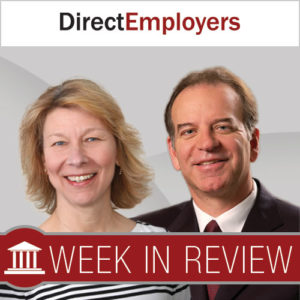 The OFCCP Week in Review (WIR) is a simple, fast and direct summary of relevant happenings in the OFCCP regulatory environment, authored by experts John C. Fox and Candee Chambers. Alexa Morgan, a founder and Partner of Fox, Wang & Morgan P.C., joins today’s edition and shares insight on last week’s regulatory updates. In today’s WIR, we cover:
The OFCCP Week in Review (WIR) is a simple, fast and direct summary of relevant happenings in the OFCCP regulatory environment, authored by experts John C. Fox and Candee Chambers. Alexa Morgan, a founder and Partner of Fox, Wang & Morgan P.C., joins today’s edition and shares insight on last week’s regulatory updates. In today’s WIR, we cover:
- North Carolina’s controversial “Bathroom Bill” undergoes small reversal
- New efforts announced by the EEOC to combat alleged religious discrimination
Monday, July 18, 2016: North Carolina Reverses a Small Portion of its Controversial “Bathroom Bill”
Lawmakers in North Carolina have signed into law HB 169, which now reverses a small portion of the controversial HB 2, known colloquially as the “Bathroom Bill” and more formally as the “Public Facilities Privacy and Security Act.” HB 2, which Governor Pat McCrory signed into law last March, sparked national criticism and is now the subject of several lawsuits. (See our May 16, 2016 WIR discussing the competing lawsuits of the State of North Carolina verses the United States and the United States verses the State of North Carolina). HB 2 prohibited all state governmental unit (i.e. local counties and cities) ordinances in North Carolina from protecting sexual orientation and gender identity, and required transgender individuals to use bathrooms that correspond with the sex on their birth certificates in government buildings, public schools, and public universities). HB 2 applies, however, only to state institutions and not private sector employers or “Government contractors” (unless the contractor happens to also be an agency of the state…like some state Universities).
Twenty days later, in response to the controversy over HB 2, Governor McCrory issued Executive Order 93 to “affirm and approve the State’s commitment to privacy and equality.” Although EO 93 did not restore the right of state governmental units to change the state’s transgender bathroom access law, the EO did make sexual orientation and gender identity discrimination unlawful in state governmental units, and clarified that private companies are permitted to establish their own restroom and locker room polices. EO 93 also requested legislation to repeal a less prominent provision of HB2 that (apparently inadvertently) eliminated the right of employees to sue in state court for wrongful termination based on any form of unlawful discrimination. Lawmakers passed the new HB 169 in response to the Governor’s Executive Order request. HB 169 reverses this unintended portion of HB 2 retroactively to March 23, 2016 and thus restores the right of employees to pursue state claims for wrongful termination based on age, sex, race, religion, color, national origin, age, biological sex, or handicap. In a statement, Governor McCrory’s spokesman said the Governor “is pleased the General Assembly has acted on his request and restored non-discrimination protections in state courts. This action reinstates all statewide non-discrimination protections that were previously in place.” The new bill, however, does not restore the previous three-year statute of limitations for state discrimination claims. Instead, HB 169 reduces the statute of limitations to one year.
Friday, July 22, 2016: The EEOC Announces New Efforts to Combat Alleged Religious Discrimination
On Friday, the EEOC announced three new developments intended to help the EEOC identify and eliminate alleged religious discrimination:
- The release of a new fact sheet titled “Religion and Your Job Rights” on its “Youth @ Work” website the EEOC hopes will help young workers better understand their rights and responsibilities under the federal employment anti-discrimination laws prohibiting religious discrimination;
- Improved collection of demographic data from individuals who file charges with the EEOC. The EEOC believes this data collection at Charge intake will allow it to determine the religion of individuals who complain of religious discrimination so that it, and the public, are better able to “recognize and respond to trends in charge data;” and
- Improved coordination efforts with the OFCCP to develop joint outreach and education efforts concerning religious discrimination. (Presumably the OFCCP will now develop responsive technical assistance documents and training modules to assist federal contractors in an area of employment discrimination OFCCP has never previously found to raise compliance concerns among Government contractors).
THIS COLUMN IS MEANT TO ASSIST IN A GENERAL UNDERSTANDING OF THE CURRENT LAW AND PRACTICE RELATING TO OFCCP. IT IS NOT TO BE REGARDED AS LEGAL ADVICE. COMPANIES OR INDIVIDUALS WITH PARTICULAR QUESTIONS SHOULD SEEK ADVICE OF COUNSEL.
Reminder: If you have specific OFCCP compliance questions and/or concerns or wish to offer suggestions about future topics for the OFCCP Week In Review, please contact your membership representative at 866-268-6206 (for DirectEmployers Association Members), or email Candee at candee@directemployers.org with your ideas.
- OFCCP Week in Review Special Edition | DEAMcon24 Day Two Recap - April 24, 2024
- OFCCP Week In Review: April 22, 2024 - April 22, 2024
- OFCCP Week in Review: April 15, 2024 - April 15, 2024

